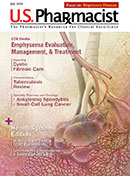In a recent article published in the Journal of the National Cancer Institute, researchers examined correlations between daily use of low-dose aspirin and increased risk of advanced forms of cancer and metastasis in older adults. In contrast to previous randomized, controlled trials that showed a delayed, but beneficial, effect of low-dose aspirin on cancer observed in younger patients, the current research team analyzed the incidence of cancer and associated mortality in older patients who received low-dose aspirin.
Dr. Andrew T. Chan, senior author of the study and affiliated with the Massachusetts General Hospital and Harvard Medical School and colleagues pursued additional follow-up on previous research which examined the use of aspirin in potentially reducing events in the elderly (ASPREE). The ASPREE study was a randomized controlled trial (RCT) that evaluated 19,114 adults in the United States or Australia who were age 70 years or older (or age 65 years and older among U.S., Hispanic, or African American individuals) who received either 100-mg (low-dose) aspirin or placebo to see if low dose of aspirin might help protect older people from adverse events including cognitive decline, dementia, or cancer.
The current study, published in March 2020, reports that this same cohort of patients who were followed for a median of 4.7 years experienced an increased risk of metastasis and diagnosis of more advanced cancers. The researchers reported that 981 subjects in the aspirin group and 952 in the placebo group had a first diagnosis of cancer regardless of cancer history or occurrence at baseline. Patients in all groups had low prior aspirin use. At the beginning of the study, 19% (n = 3,660) had a prior diagnosis of cancer that excluded nonmelanoma skin cancers, while 80.4% (n = 15,375) had no cancer diagnoses prior to randomization. Cancer history and status were unknown for 0.4% (n = 79). The reported rate of medication adherence was similar for both groups.
The authors noted that there was no statistically significant difference between groups for all-incident cancers. The researchers concluded that aspirin was not associated with risk of diagnosis of a first-incident cancer event (HR, 1.04; 95% CI, 0.95-1.14), an incident localized cancer (HR, 0.99; 95% CI, 0·89-1.11), or an incident hematological or lymphatic cancer (HR, 0.98; 95% CI, 0.73-1.30). However, the scientists observed an increased number of participants with metastatic cancer at diagnosis (HR, 1.19; 95% CI, 1.00-1.43) or stage 4 cancer at diagnosis (HR, 1.22; 95% CI, 1.02-1.45) in the aspirin group. These patients were also at higher risk of death from cancer that presented as stage 3 at diagnosis (HR, 2.11; 95% CI, 1.03-4.33) or stage 4 (HR, 1.31; 95% CI, 1.04-1.64).
.
According to Dr. Chan, “Deaths were particularly high among those on aspirin who were diagnosed with advanced solid cancers, suggesting a possible adverse effect of aspirin on the growth of cancers once they have already developed in older adults,” he said and went on to express caution when considering this potential impact of aspirin, saying “Although these results suggest that we should be cautious about starting aspirin therapy in otherwise healthy older adults, this does not mean that individuals who are already taking aspirin, particularly if they began taking it at a younger age, should stop their aspirin regimen.”
The content contained in this article is for informational purposes only. The content is not intended to be a substitute for professional advice. Reliance on any information provided in this article is solely at your own risk.
Published September 17, 2020






